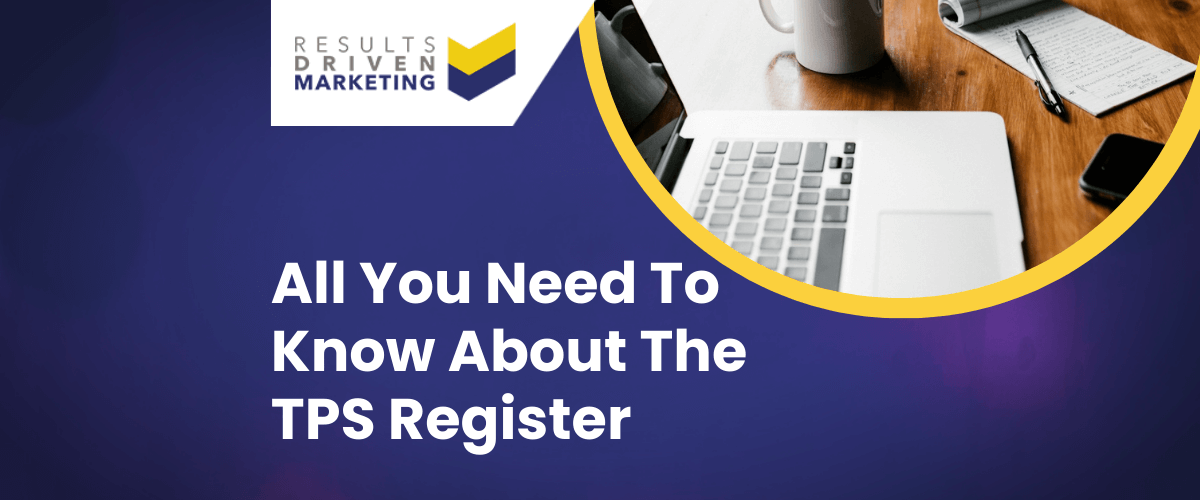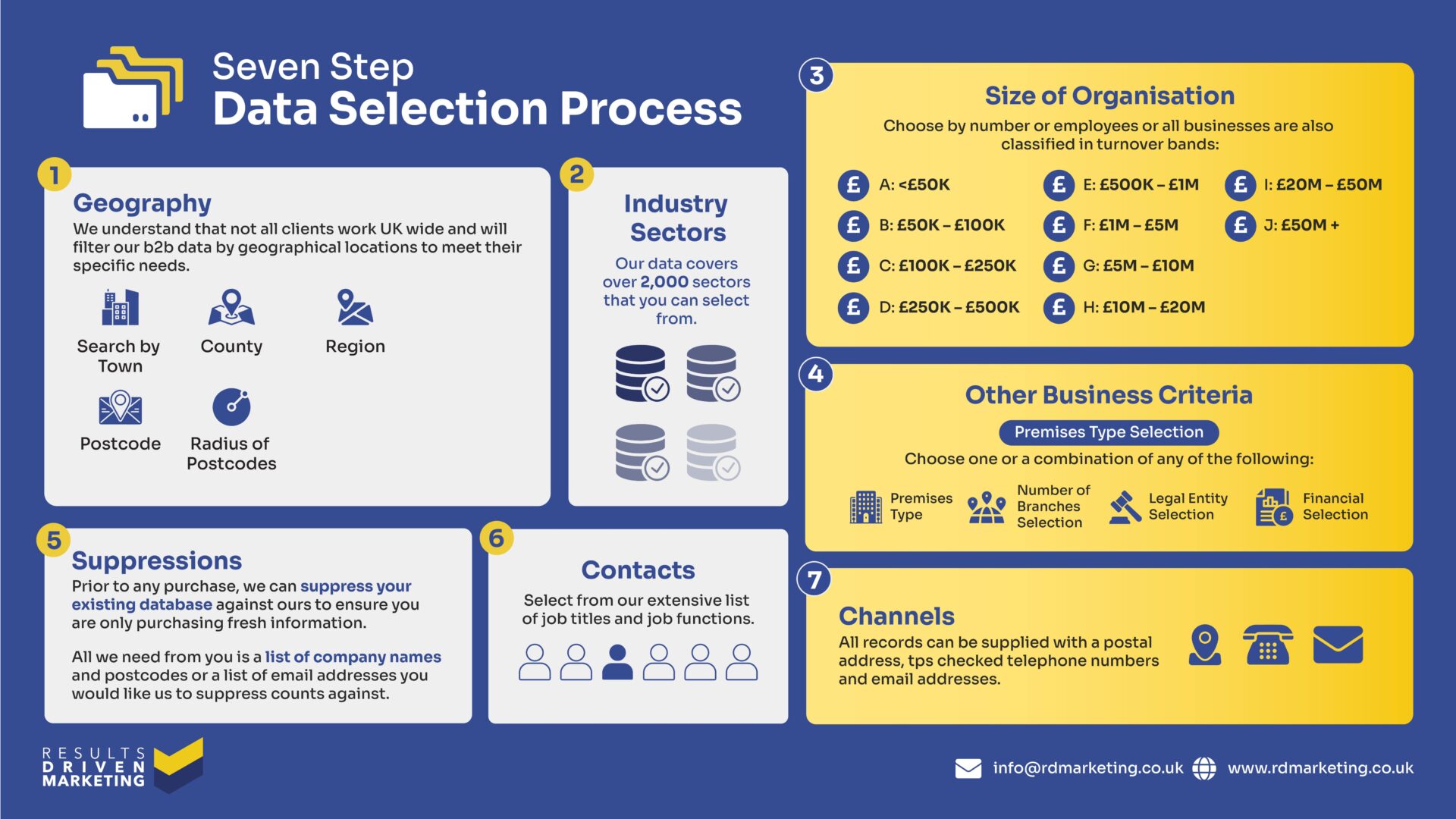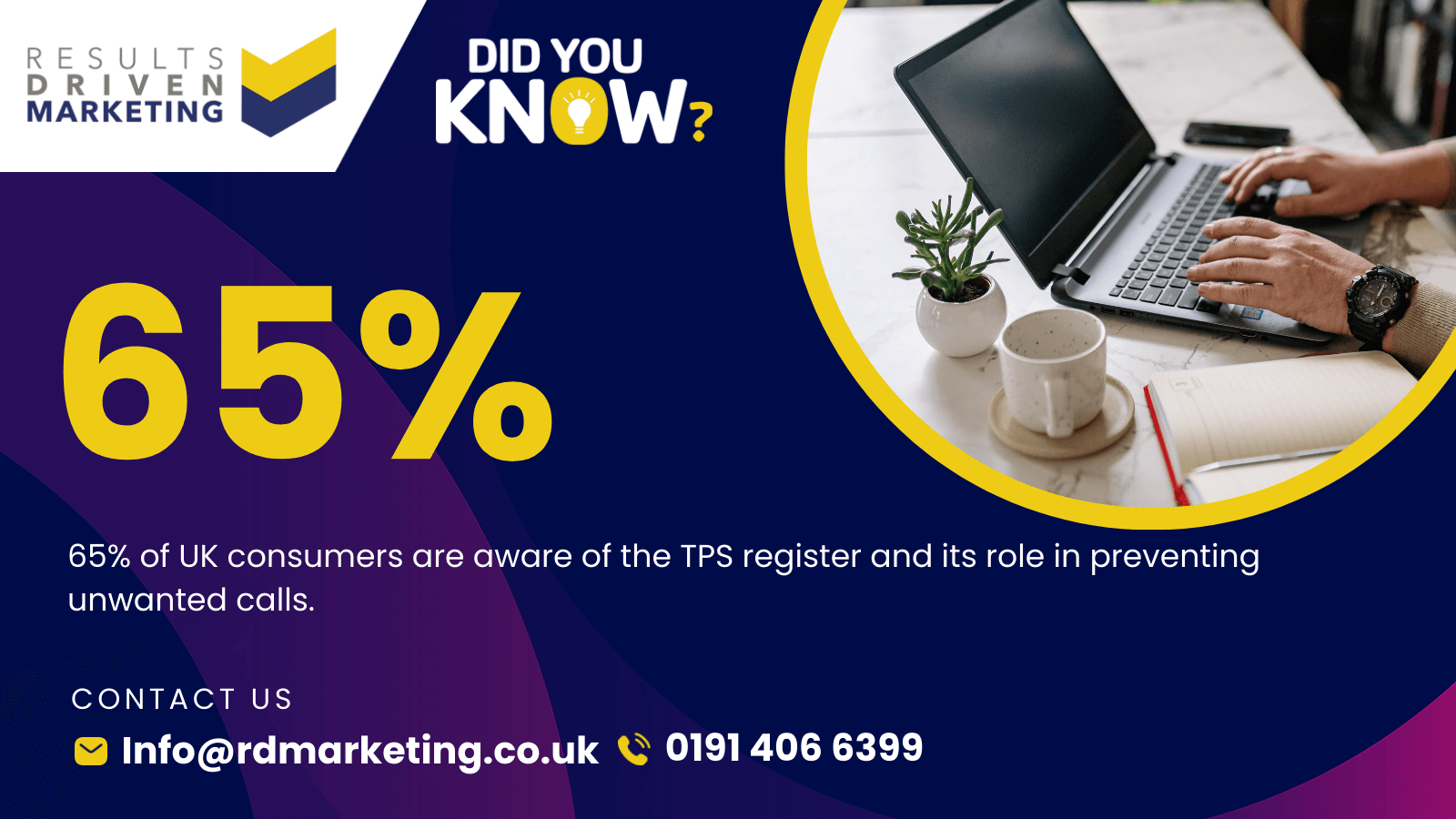
All You Need To Know About The TPS Register
The TPS Register—formally known as the Telephone Preference Service—plays a vital role in helping both everyday consumers and busy business owners reduce annoying and intrusive marketing calls. By joining the TPS Register, individuals can directly opt out of unsolicited telemarketing, gain peace of mind, and stop wasting time dealing with unwanted phone disruptions. For companies, adhering to the TPS Register guidelines ensures TPS compliance with regulations, maintaining brand reputation and respecting consumer privacy.
This level of consumer protection not only benefits people at home but also ensures marketers target the right audiences with relevant data. At RDMarketing.co.uk, we know the importance of reaching the right prospects efficiently. We offer B2B Data solutions that help businesses connect with their ideal customers. When you leverage the TPS Register, everyone wins—consumers receive fewer nuisance calls, and businesses engage with more receptive audiences. It’s a simple step towards a more respectful marketing landscape.
Table of contents:
What is the TPS Registration?
The TPS telephone register, short for the Telephone Preference Service, is essentially a “do not call” database designed to protect individuals from receiving unwanted sales or marketing calls.
It is a free service available to anyone in the UK, giving consumers the option to opt out of telemarketing communications by registering their phone numbers. Once registered, businesses are legally required to avoid contacting those numbers for marketing purposes, making the TPS telephone register a key component in the country’s telemarketing regulations.
How Was the TPS Telephone Register Established?
The TPS register was set up in 1999 under the Privacy and Electronic Communications Regulations (PECR), which governs how businesses should handle unsolicited marketing communications.
Managed by the Direct Marketing Association (DMA) and enforced by the Information Commissioner’s Office (ICO), the TPS exists as a measure to protect consumer privacy and ensure businesses respect the preferences of individuals who don’t wish to be disturbed by marketing calls.
The PECR regulations were created to complement the Data Protection Act, making sure that businesses are transparent in how they handle consumer data and that people’s preferences are respected when it comes to direct marketing, whether by phone, email, or mail.
For businesses, it’s vital to not only understand these laws but also to maintain up-to-date data for marketing efforts. Leveraging accurate B2B data and services like data cleansing can help ensure compliance and reduce the risk of penalties.
The Purpose of the TPS Telephone Register
The core reason to register with TPS for mobile is to give consumers control over who contacts them. In an era where personal data is often used for various marketing activities, the TPS offers a straightforward way to opt out of unwanted calls.
For businesses, the TPS serves as a safeguard, ensuring that marketing efforts are not only compliant but also more efficient by targeting those who are actually open to receiving calls. This way, companies avoid wasting resources on consumers who are not interested in their services.
When combined with email address list data or direct mail data, businesses can target the right people while ensuring that they’re compliant with UK laws. Failure to adhere to the TPS telephone register rules can result in fines and other legal consequences, which can be damaging both financially and reputationally.
TPS vs. CTPS: What’s the Difference?
While the TPS register is designed to protect individual consumers from unwanted marketing calls, there is another register called the Corporate Telephone Preference Service (CTPS).
The CTPS offers similar protection but specifically for businesses or corporate entities. Just as individuals can register with TPS for mobile, companies can register their business numbers with the CTPS to avoid unsolicited calls.
It’s essential for businesses engaged in B2B telemarketing to use a CTPS checker to make sure they’re not contacting corporate numbers that have opted out. Failure to respect the CTPS can result in the same penalties as failing to comply with the TPS.
By understanding both how to register with TPS for mobile and the CTPS, businesses can not only stay compliant but also maintain a positive brand image by respecting consumer and corporate privacy preferences.
For companies looking to expand their reach without running afoul of telemarketing laws, services like international email list data and consumer data can help expand marketing efforts globally, while still adhering to local and international regulations.
Why the TPS Register Matters for Businesses
For any business operating in the UK, especially those involved in telemarketing or direct consumer outreach, the TPS register is not just a helpful tool—it’s a legal requirement. Companies need to understand their obligations and the potential consequences of ignoring the TPS register.
Staying compliant with UK laws is crucial to avoid fines, penalties, and even legal action.
Legal Obligations for Businesses Under UK Law
In the UK, any business making unsolicited marketing calls must ensure that they are not contacting individuals who have registered with the TPS telephone register. The Privacy and Electronic Communications Regulations (PECR), which governs these activities, makes it clear that contacting individuals on the TPS register is illegal without prior consent.
This regulation is enforced by the Information Commissioner’s Office (ICO), which is responsible for ensuring that businesses comply with data privacy laws.
To stay compliant, businesses must regularly screen their call lists against the TPS database. For those in the B2B sector, it’s just as important to use a CTPS checker to ensure corporate numbers are not being contacted illegally. Companies that fail to adhere to these rules are risking significant penalties.
Consequences of Failing to Comply
What happens if your business fails to comply with the TPS register? The penalties can be steep. Businesses can face fines of up to £500,000 if they call numbers that are registered on the TPS.
Moreover, breaches of the regulations often lead to complaints filed with the ICO, which can result in legal action against the company. These penalties aren’t just financial—they can also damage your reputation, potentially driving away future business. This makes it essential to invest in services like data cleansing to ensure your marketing lists are clean, accurate, and compliant.
Here’s a quick breakdown of the consequences of failing to comply with the TPS register:
Financial Penalties: Fines of up to £500,000 for non-compliance.
Legal Action: Possible lawsuits or legal orders from the ICO.
Reputation Damage: A damaged reputation can make it difficult to retain customers or win new business.
Loss of Trust: Customers may lose trust in your brand if their preferences aren’t respected.
By staying compliant with the TPS register, businesses can avoid these pitfalls and focus on building better customer relationships.
The Role of the Information Commissioner’s Office (ICO)
The ICO is the UK’s data protection watchdog and plays a crucial role in enforcing telemarketing laws. They have the power to investigate complaints, issue fines, and even take legal action if businesses fail to comply with the TPS register regulations.
The ICO operates on the principles of protecting consumer data and ensuring that businesses adhere to laws like the PECR and the Data Protection Act.
It’s important for businesses to maintain open communication with the ICO if they receive any complaints or warnings. Being proactive about compliance can often prevent more serious legal consequences down the line.
For companies seeking help in managing their compliance, services such as email marketing management or B2B telemarketing data can streamline the process.
Benefits of Adhering to the TPS Telephone Register
So, what are the benefits of complying with the TPS register? Beyond avoiding hefty fines and penalties, there are numerous advantages for businesses that make an effort to follow the rules:
- Enhanced Reputation: Adhering to the TPS shows that your company respects consumer preferences and data privacy laws, which builds trust.
- Improved Efficiency: By only contacting individuals who are open to marketing calls, your business can save time, money, and effort. This improves the efficiency of your telemarketing campaigns and boosts conversion rates.
- Fewer Complaints: Compliance with the TPS means fewer complaints to the ICO, resulting in smoother operations and less regulatory scrutiny.
- Legal Protection: Staying compliant means you’re on the right side of the law, protecting your business from potential legal actions or fines.
Companies that follow the TPS register guidelines tend to have better success with their marketing efforts. Using B2B data that is up-to-date and pre-screened for compliance ensures your outreach is targeted and effective. In addition, businesses can enhance their data quality through services like data enrichment, which can help in refining their marketing lists.
How the TPS Register Works
The TPS register is a straightforward tool designed to help consumers protect their privacy, and for businesses, it ensures compliance with UK telemarketing laws.
But how does the TPS register work in practice? Let’s walk through the steps of how consumers can register, how businesses can access the TPS database, and how often companies should check the TPS register to remain compliant.
How Consumers Can Register Their Number with the TPS
For consumers, registering with the TPS register is a simple and free process. Here’s how it works:
Online Registration: Individuals can go to the official TPS website and register their number. This process typically takes only a few minutes.
By Phone: Alternatively, consumers can register by calling the TPS service directly. Once their number is added, it can take up to 28 days for it to become fully effective.
Confirmation: After the number is registered, the individual should receive confirmation that their phone number has been added to the TPS register.
Once registered, consumers are legally protected from receiving unsolicited marketing calls from businesses, unless they have explicitly given their consent to be contacted.
By registering with the TPS, individuals are taking a proactive step toward reducing the number of unwanted calls, offering peace of mind and added control over who can contact them.
How Businesses Can Access the TPS Database
For businesses, accessing the TPS register is equally crucial, as it allows them to avoid contacting individuals who do not want to receive marketing calls. Companies can subscribe to the TPS database, and there are several ways to do this:
TPS Subscription: Businesses can subscribe to the TPS service directly, either for a specific number of checks or unlimited access depending on their needs. This ensures they always have access to the most up-to-date data.
TPS Checking Tools: Many businesses use automated tools to streamline the process of screening phone numbers. These tools can check a list of numbers against the TPS database, ensuring compliance with minimal effort.
Third-Party Services: Some businesses choose to work with third-party services to handle TPS compliance. For instance, our CTPS checker service ensures businesses don’t accidentally contact corporate numbers registered on the Corporate Telephone Preference Service (CTPS).
It’s vital that businesses check their contact lists regularly and maintain up-to-date telemarketing data. Using accurate and clean B2B data, for instance, helps prevent any compliance issues, ensuring companies don’t face the financial or reputational damage of fines.
Frequency and Methods for Businesses to Check the Registration with TPS for Mobile
How often should businesses check the TPS registration? The legal requirement is that companies must screen their numbers against the TPS database every 28 days. This means that before launching any new telemarketing campaign, businesses need to ensure their lists are up-to-date and compliant.
Here’s how businesses can stay on top of compliance:
- Monthly Checks: At minimum, businesses must ensure they’re checking their lists once every 28 days. This is especially important for companies using large volumes of direct mail data or consumer data for marketing outreach.
- Automated TPS Checking: Automated TPS checking tools can streamline the process by constantly updating call lists against the latest TPS data. These tools can flag numbers that should not be contacted, helping businesses stay compliant with minimal manual work.
- Data Cleansing: Regularly cleaning your database is a good practice to maintain accuracy and compliance. Services like data cleansing help ensure that your contact lists remain accurate, eliminating outdated or non-compliant numbers.
By sticking to these best practices, businesses can confidently engage in telemarketing campaigns, knowing they are respecting consumer preferences and staying compliant with UK regulations.
Steps for Businesses for TPS Compliance
Navigating the TPS register can feel daunting for businesses, but staying compliant is crucial to avoid legal penalties and protect your brand reputation. Fortunately, it’s a manageable process when broken down into a step-by-step guide.
Here’s everything you need to know about checking numbers against the TPS, how often you need to do it, and the tools available to make TPS compliance easier.
Step-by-Step Guide to Checking Numbers Against the TPS
Obtain Your Call List: First, gather the list of phone numbers you plan to use in your telemarketing or marketing campaign. Whether you’re working with internal data or purchasing B2B telemarketing data, it’s essential to ensure these numbers are verified before making any calls.
Subscribe to the TPS Database: To access the TPS register, businesses need to subscribe to the service. You can do this directly through the TPS website. The subscription allows you to upload and cross-check your list against the TPS database.
Check Numbers Using TPS Tools: Once you have access, you can either upload your call list manually or use automated tools to verify the numbers.
These tools will flag any numbers registered on the TPS register, ensuring you don’t accidentally contact consumers who’ve opted out of marketing calls. For businesses dealing with B2B outreach, consider using a CTPS checker to ensure corporate numbers are compliant too.
Update Your Contact Lists: After screening the numbers, update your contact lists by removing or flagging any that are on the TPS register. This step is critical to avoid accidentally contacting individuals who are registered.
Keep a Record of TPS Compliance: Always keep records of your checks, including when you last screened your call list and which numbers were flagged. Maintaining accurate records is key in the event of an audit or complaint. Services like data enrichment can help ensure your data is both compliant and up-to-date, improving the quality of your marketing efforts.
Frequency of Checks Required by Law
UK law mandates that businesses check the TPS register at least once every 28 days. This means that any time you plan a new telemarketing campaign, you must ensure your numbers are compliant within this window.
If your business frequently engages in marketing calls, using automated TPS checking tools can help you keep up with this requirement without much hassle.
Failing to check your numbers frequently enough can lead to severe penalties, so make it a priority to adhere to this 28-day rule. Whether you’re marketing through direct mail data, telemarketing, or any other outbound approach, ensuring compliance before each campaign is critical.
Tools and Software Available for TPS Compliance
The good news is that businesses don’t have to go through this process manually. There are various tools and software options designed to help companies maintain TPS register compliance. These options range from basic manual checking systems to fully automated solutions.
- Manual TPS Checking Tools: Ideal for smaller businesses with fewer numbers to check, these tools allow you to manually upload your list and receive results directly.
- Automated TPS Compliance Software: Larger businesses or those who regularly engage in telemarketing benefit from automated TPS compliance tools. These tools integrate with your CRM or marketing platforms and automatically screen numbers at regular intervals, ensuring you’re always compliant. Pairing this with email marketing management systems can streamline your entire marketing approach.
- CTPS and International Data Tools: If your business also markets to corporate entities or international audiences, you’ll want to incorporate tools like a CTPS checker or ensure your outreach to global markets complies by using international email lists.
Importance of Keeping Accurate Records
One of the most important elements of staying compliant with the TPS register is maintaining detailed and accurate records. This includes logging when checks were conducted, which numbers were flagged, and how your list was updated afterward.
If your business ever faces a complaint or an inquiry from the Information Commissioner’s Office (ICO), having accurate records will be critical to proving your TPS compliance.
Here are some best practices for record-keeping:
- Document Every Check: Record the date of every TPS screening you perform. This will show that you are regularly ensuring TPS compliance.
- Store Updated Lists: Keep a copy of your updated call lists after each TPS check, showing that flagged numbers have been removed or excluded.
- Use Data Cleansing Services: Regular data cleansing can help ensure that your records are always accurate and that outdated or incorrect numbers are removed.
By following these steps, your business can ensure that it remains on the right side of UK telemarketing laws while maintaining a positive relationship with consumers.
Common Misconceptions About the TPS Registeration
There are several misconceptions about the TPS register that can lead to confusion for both businesses and consumers. While the TPS registration is an effective tool to protect privacy, it’s important to understand the full scope of how it works.
Here, we’ll clear up some common misunderstandings, including whether the TPS covers mobile numbers, the differences between TPS and CTPS, and what happens if a consumer registers while already in contact with a business.
Does the TPS Register Cover Mobile Numbers?
One of the most frequent misconceptions is that the TPS registration only covers landline numbers. In reality, the TPS covers both landline and mobile numbers. Whether a consumer registers their home phone or mobile, businesses must ensure they are not contacting those numbers with unsolicited marketing calls.
This is crucial for businesses engaged in mobile-based marketing efforts. Ensuring that all numbers, including mobiles, are screened against the TPS registration is a legal requirement.
Many businesses use tools and services to simplify the process of screening numbers. For example, telemarketing data providers can offer lists that have already been verified for compliance, saving companies time and resources.
Difference Between TPS, CTPS, and Other Do-Not-Call Lists
Another area of confusion lies in understanding the difference between the TPS register, the Corporate Telephone Preference Service (CTPS), and other do-not-call lists. Here’s how they differ:
- TPS (Telephone Preference Service): This is designed for individual consumers, covering both landlines and mobile numbers. Individuals who do not want to receive unsolicited marketing calls can register their numbers with the TPS register.
- CTPS (Corporate Telephone Preference Service): The CTPS serves a similar function, but it is specifically for businesses and corporate entities. Companies can register their business phone numbers with the CTPS to avoid being contacted by telemarketers. If your business focuses on B2B marketing, it’s essential to screen against both the TPS and CTPS databases. Our CTPS checker can help you ensure TPS compliance with both.
- Other Do-Not-Call Lists: Some countries have their own versions of the TPS, but these are separate from the UK’s TPS. If you’re marketing internationally, it’s important to be aware of each country’s regulations. For instance, using international email lists requires a solid understanding of local telemarketing laws to stay compliant.
What Happens if a Consumer Registers While Already in Contact with a Business?
This is another area where there is often confusion. Many businesses wonder what happens if they’re already in contact with a consumer who then registers their number on the TPS register. Does the company have to stop all communications?
Here’s how it works: If a consumer is already a customer and has given consent to be contacted, the business can continue to reach out as long as that consent remains valid.
However, if the consumer is not a customer or withdraws their consent, the business must stop contacting them for marketing purposes—even if they have an ongoing relationship. It’s essential to document consent properly and ensure your contact lists are updated accordingly.
For businesses that manage large volumes of customer data, services like data cleansing can be invaluable for keeping databases accurate and ensuring consent is respected.
Consequences of Ignoring the TPS Register
Ignoring the TPS register can lead to serious consequences for businesses. Not only can it result in hefty fines, but it can also damage the reputation and trustworthiness of a brand.
Let’s dive into some real-world examples, the role of the Information Commissioner’s Office (ICO) in enforcing these penalties, and the long-term effects on business reputation for non-TPS compliance.
Insights Into Enforcement Actions by the ICO
The Information Commissioner’s Office (ICO) is responsible for enforcing compliance with the TPS register. They are equipped with a range of powers, including the ability to conduct investigations, issue warnings, and, when necessary, impose significant fines.
The ICO receives complaints from individuals who are registered with the TPS but continue to receive unsolicited marketing calls.
Once a complaint is received, the ICO investigates the matter, and if a business is found to have violated PECR (Privacy and Electronic Communications Regulations), they face penalties. The ICO has no tolerance for repeated offenders or businesses that fail to respect the TPS rules.
To avoid these consequences, companies can take proactive steps such as employing regular data cleansing services and using tools like a CTPS checker to ensure their corporate calls are also compliant.
Long-Term Impacts on Business Reputation and Trustworthiness
The financial penalties for ignoring the TPS register are steep, but the damage to a business’s reputation can be even worse. Trust is the cornerstone of any successful business, and repeatedly violating consumer privacy erodes that trust.
Word spreads quickly when a business disregards customer preferences, and a tarnished reputation can be hard to rebuild.
Consumers expect businesses to respect their preferences, and failing to comply with the TPS register can lead to:
- Negative Reviews: Customers who feel their privacy is violated are likely to leave negative reviews online, which can harm future sales.
- Loss of Trust: Once trust is broken, it’s difficult to regain. Ignoring the TPS register may drive away loyal customers and make it challenging to attract new ones.
- Decreased Customer Engagement: If customers feel their privacy isn’t respected, they’re less likely to engage with future marketing efforts—whether it’s through email marketing or direct mail campaigns.
In today’s competitive market, where consumers are more informed and concerned about privacy than ever before, maintaining trust and credibility is essential for success. By staying compliant with the TPS register and using verified email address list data, businesses can ensure that they build meaningful, lasting customer relationships.
How Consumers Benefit from the TPS Register
The TPS register offers significant benefits for consumers, primarily in terms of privacy protection. It empowers individuals by allowing them to control who can contact them for marketing purposes.
By registering their phone numbers, people can drastically reduce the number of unwanted sales calls, enhancing their privacy and giving them more control over their personal data.
Privacy Protection for Individuals
In today’s world, where personal data is often shared, sold, and used without explicit permission, the TPS register serves as a critical line of defense for individuals.
It ensures that telemarketing companies cannot contact registered numbers unless explicit consent has been granted.
For consumers, this means:
- Fewer Unwanted Calls: The most obvious benefit is a significant reduction in unsolicited marketing calls. Once registered, consumers can expect most businesses to respect their preference to not be contacted.
- Enhanced Privacy: Registering with the TPS register prevents companies from using personal phone numbers for marketing purposes, keeping sensitive information private.
- Peace of Mind: Knowing that they have control over who contacts them brings consumers peace of mind, especially in an era of increasing telemarketing scams and data misuse.
For those looking for compliant marketing solutions, businesses can opt for high-quality, pre-screened B2B telemarketing data to ensure they are reaching only consenting individuals.
Steps for Consumers to Register and What They Can Expect
The process of registering a phone number on the TPS register is straightforward and free. Here’s a step-by-step guide for consumers:
Visit the TPS Website: Consumers can head over to the official TPS website to register their phone numbers.
Submit Your Phone Number: Simply enter the landline or mobile number you wish to register. Both types of numbers are covered under the TPS register, which means individuals can protect their privacy across multiple devices.
Confirm Registration: Once the phone number is submitted, consumers will receive a confirmation of their registration. It typically takes 28 days for the registration to be fully effective, after which unsolicited calls should stop.
What to Expect After Registration: After registering with the TPS, individuals can expect fewer unsolicited marketing calls within 28 days. However, it’s important to note that registration only prevents unsolicited calls—it doesn’t apply to companies with whom the individual has an existing relationship or has previously given consent.
By leveraging consumer data that complies with the TPS, businesses can ensure they are reaching the right audience without infringing on privacy preferences.
How to Make a Complaint if Telemarketers Breach the TPS
Even after registering with the TPS register, some consumers may still receive unwanted calls from companies that fail to check the register or ignore the rules. If this happens, consumers have the right to file a complaint with the Information Commissioner’s Office (ICO).
Here’s how consumers can make a complaint:
Gather Evidence: Before filing a complaint, it’s helpful to gather as much information as possible, such as the company’s name, phone number, and the date and time of the call.
File the Complaint: Consumers can visit the ICO’s website to file a complaint online. They will need to provide details of the unsolicited call and confirm that they were registered with the TPS register at the time.
ICO Investigation: The ICO will then investigate the complaint, and if the company is found to be in breach of the TPS register, they may face penalties. In some cases, the ICO may issue warnings or fines to businesses that repeatedly ignore the TPS register.
By making it easy for consumers to file complaints, the TPS helps maintain accountability and protects individuals from persistent breaches. For businesses, adhering to these guidelines is crucial, and tools like CTPS checker can help avoid such violations.
Frequently Asked Questions (FAQ)
When it comes to the TPS register, businesses often have several questions about how it works, especially regarding existing customers, the frequency of checks, and how the TPS compares to the CTPS for business numbers. Here, we address some of the most common queries to help ensure your business stays compliant and avoids any unnecessary fines.
Can I Still Contact Existing Customers if They’re on the TPS?
Yes, businesses can still contact existing customers even if they are on the TPS register, but there are a few important caveats. If a customer has previously given explicit consent to receive marketing calls, that consent overrides their registration on the TPS. However, this applies only to the company they gave consent to; third-party calls are not allowed.
It’s essential to keep records of this consent to avoid any confusion. If the customer later withdraws their consent, even if they’re an existing customer, you must respect their decision and stop contacting them for marketing purposes.
To ensure you have accurate data, tools like data enrichment services can help keep customer information up-to-date and compliant.
How Often Do I Need to Check Numbers Against the TPS?
By law, businesses are required to check their marketing call lists against the TPS register every 28 days. This is crucial to ensure that your lists remain compliant, as consumers may register their numbers with the TPS at any time. Regular checks prevent businesses from unknowingly calling individuals who have opted out of unsolicited marketing calls.
Businesses can streamline this process by using automated tools that continuously check their call lists for TPS compliance. Services like data cleansing help ensure your lists are accurate and free of non-compliant numbers. Automated TPS checking tools are highly recommended for companies with large datasets to make the process more efficient.
Is the TPS the Same for Business Numbers (CTPS)?
No, the TPS register and CTPS (Corporate Telephone Preference Service) serve different purposes. While the TPS covers individual consumers, including their landline and mobile numbers, the CTPS is specifically designed for business or corporate telephone numbers.
If your business is involved in B2B marketing or telemarketing, it’s important to screen your lists against both the TPS register and the CTPS to avoid contacting businesses that have opted out. You can use our CTPS checker to ensure compliance when dealing with corporate clients.
Businesses marketing internationally should also be aware of other regional regulations and ensure TPS compliance by using services such as international email lists, which are pre-screened for compliance with local data protection laws.
In summary, the TPS register is an essential tool for both businesses and consumers. For businesses, TPS compliance is not only a legal requirement but also a way to build trust and protect their reputation.
By respecting consumers’ preferences, companies can avoid hefty fines, maintain their brand image, and improve the effectiveness of their marketing efforts.
Regularly checking your call lists against the TPS register, using a CTPS checker for corporate contacts, and leveraging clean, compliant B2B telemarketing data will help you stay on the right side of the law while also maximising your outreach.
Hence….
For consumers, registering with the TPS register is a simple and effective way to protect yourself from unwanted calls. It puts control back in your hands, allowing you to enjoy greater privacy and fewer interruptions.
If you haven’t yet registered your number, you can easily do so via the TPS official site. If you’re receiving unsolicited calls despite being registered, complaints can be made directly to the ICO, which will take action against non-compliant businesses.
In a world where privacy and trust are paramount, the TPS register ensures that consumers can safeguard their preferences, while businesses can engage in ethical and legal marketing practices.
Whether you’re a business needing to source compliant direct mail data, email address lists, or you’re looking for tools like data cleansing to keep your data clean and compliant, adhering to TPS regulations is key.
By staying compliant, businesses foster trust and open the door to meaningful interactions, while consumers can rest easy knowing their preferences are respected. For further assistance with compliance and high-quality data services, feel free to explore our offerings at Results Driven Marketing.
Who are we?
Thinking about “how do I buy data“?
Providing b2b database solutions is our passion.
Offering a consultancy service prior to purchase, our advisors always aim to supply a database that meets your specific marketing needs, exactly.
We also supply email marketing solutions with our email marketing platform and email automation software.
Results Driven Marketing have the best data of email lists for your networking solutions as well as direct mailing lists & telemarketing data in telemarketing lists
We provide data cleansing and data enrichment services to make sure you get the best data quality.
We provide email marketing lists and an international email list for your business needs.
At RDM We provide b2c data as we have connections with the best b2c data brokers.
A good quality b2b database is the heartbeat of any direct marketing campaign…
It makes sense to ensure you have access to the best!
Call us today on 0191 406 6399 to discuss your specific needs.
Results Driven Marketing
0191 406 6399












